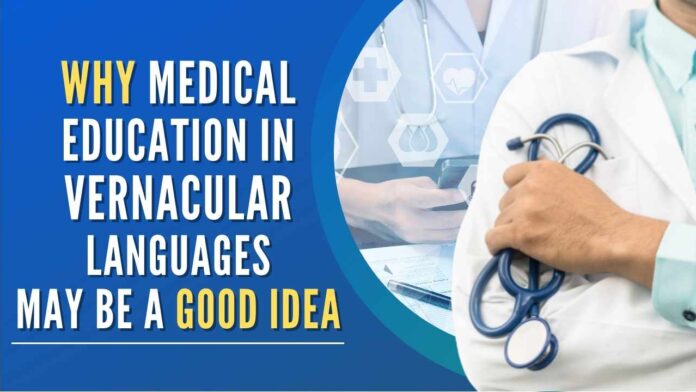
Should medical education be taught in vernacular languages?
One of the topics of intense national debate a while back was whether medical education should be imparted in vernacular languages. I was following some of the debates and as far as I have seen, opinions are mostly divided based on which side of the political spectrum one belongs to rather than based on objective analysis.
Recently, nationwide publicity was given to the publishing of transliterated medical textbooks in Hindi in MP, without changing the medical/ technical terminologies. It was clarified that these books are not in lieu of the existing textbooks in English, but to supplement them so that students from the vernacular medium can understand the concepts better.
Dr. Devi Shetty, Founder-Director of Narayana Hrudayalaya, Bangalore has been advocating for many years, the need for opening up medical education almost as we did with Engineering education. He’s been saying that it is students from the rural poor financial background who have been observed to have a fire in the belly and perform well in the medical field, rather than students from urban rich backgrounds.[1]
Surely, the initiative of the MP government to supplement English language-based textbooks with vernacular-translated textbooks will help such rural students, and to that extent, the MP government’s initiative appears to be a step in the right direction. But the question arises, what percentage of the total medical students do they constitute?
Here again, Dr. Devi Shetty is of the view that the more students we get from rural backgrounds, the merrier, because he says overall, in India, we have fewer doctors per million of population, but we have an abundance of them in cities, and a huge shortfall in rural areas and urban medical graduates are unwilling to serve in rural areas.
If a certain percentage of the seats in medical education are reserved for imparting in vernacular languages, urban students may not be willing to take these seats, and rural seats will take them. If ‘an education loan’ is given to these students, students from rural backgrounds can fill these seats. The government can, fully or partly, pay back the loan on behalf of these students, when they graduate and work as doctors in rural areas for a certain number of years.
There have also been talks by some politicians about the need for imparting even professional/ higher education solely in vernacular languages, arguing that this is already done in several countries like China, Russia, Germany, etc. If the state or Central governments make any such moves, it will be suicidal because our doctors will be cut off from the rest of the world. Today they enjoy a high level of acceptance all over the world. And some of our doctors in cities are among the best in the world.
We can have some students studying medicine in vernacular languages, and others in English. Such a policy will help us produce medical graduates for rural, urban, and international hospitals.
Note:
1. Text in Blue points to additional data on the topic.
2. The views expressed here are those of the author and do not necessarily represent or reflect the views of PGurus.
Reference:
[1] “We have made medical education elitist, out of reach of poor families. It will have consequences”: Cardiac Surgeon Devi Shetty – Dec 24, 2017, Indian Express
PGurus is now on Telegram. Click here to join our channel and stay updated with all the latest news and views
For all the latest updates, download PGurus App.
- How BJP can get 33%+ vote share in TN - April 1, 2024
- A transparent, equitable electoral funding alternative - March 19, 2024
- How TN BJP can come to No. 1 or No. 2 in 2024 LS polls - January 11, 2024










